高一英语上册 Unit 1 Occupation教学设计1 上海新世纪版
- 格式:doc
- 大小:59.50 KB
- 文档页数:6
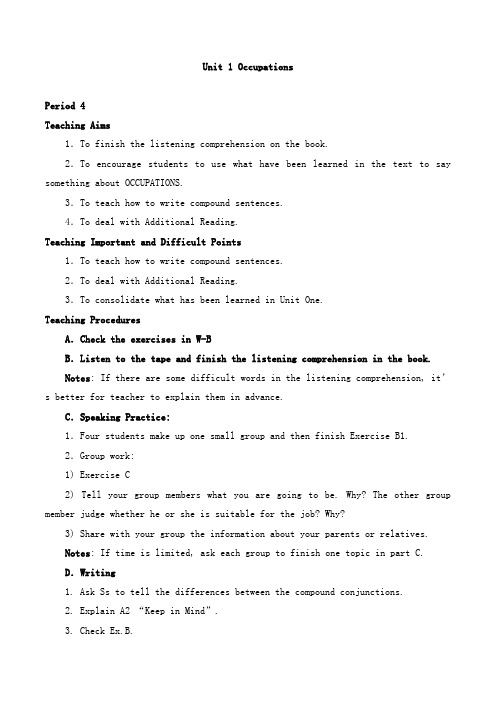
Unit 1 OccupationsPeriod 4Teaching Aims1.To finish the listening comprehension on the book.2.To encourage students to use what have been learned in the text to say something about OCCUPATIONS.3.To teach how to write compound sentences.4.To deal with Additional Reading.Teaching Important and Difficult Points1.To teach how to write compound sentences.2.To deal with Additional Reading.3.To consolidate what has been learned in Unit One.Teaching ProceduresA.Check the exercises in W-BB.Listen to the tape and finish the listening comprehension in the book.Notes: If there are some difficult words in the listening comprehension, it’s better for teacher to explain them in advance.C.Speaking Practice:1.Four students make up one small group and then finish Exercise B1.2.Group work:1) Exercise C2) Tell your group members what you are going to be. Why? The other group member judge whether he or she is suitable for the job? Why?3) Share with your group the information about your parents or relatives.Notes: If time is limited, ask each group to finish one topic in part C.D.Writing1.Ask Ss to tell the differences between the compound conjunctions.2.Explain A2 “Keep in Mind”.3.Check Ex.B.E.Additional reading:1.Read the new words.2.Pre-teach some key words1)go on to do/to a…2)course of study3)for example4)even though5)insist that6)make up one’s own mind about7)on the other hand8)business management9)be grateful that10)force sb. to do11)take an interest in12)make a great decision13)(all) on one’s own14)give up3.Ask students to read the passage and finish the exercises.4.Ask students the question: Do you think parents should decide their children’s career?F.Dictation:a.Words and phrases1.graduate2.swan3.course of study4.force sb. to do sth.5.be grateful to sb. for sth.6.on one’s own7.follow a career as a composerb.Translation1.Even though you have make up your mind to study business management, you can give it up2.He insisted that he should choose to study medicine in college.G.Check the answers of the exercises on the work-book.Homework:1.Preview Writing Compound Sentences and finish Ex B Practicing Writing.2.Review the words and underline phrases inn the Add-R.a)management—manage—managerb)grateful-use.c)composer—composed) Make sentences: make up one’s mind, on the other hand, make a great decision, on one’s own, give up.3.Translation●尽管父母要他成为医生,但他决定从事教书工作。
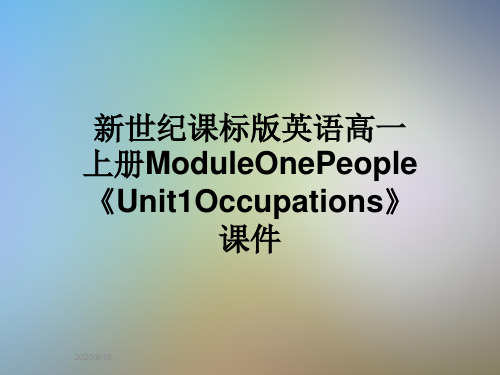
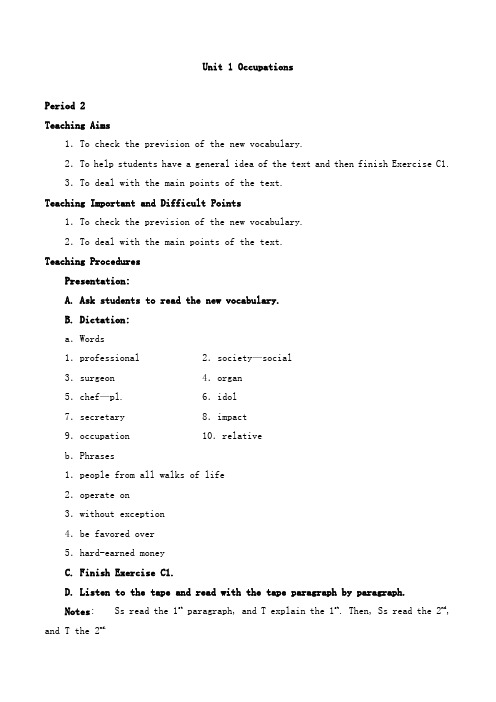
Unit 1 OccupationsPeriod 2Teaching Aims1.To check the prevision of the new vocabulary.2.To help students have a general idea of the text and then finish Exercise C1.3.To deal with the main points of the text.Teaching Important and Difficult Points1.To check the prevision of the new vocabulary.2.To deal with the main points of the text.Teaching ProceduresPresentation:A.Ask students to read the new vocabulary.B.Dictation:a.Words1.professional 2.society—social3.surgeon 4.organ5.chef—pl. 6.idol7.secretary 8.impact9.occupation 10.relativeb.Phrases1.people from all walks of life2.operate on3.without exception4.be favored over5.hard-earned moneyC.Finish Exercise C1.D.Listen to the tape and read with the tape paragraph by paragraph.Notes: Ss read the 1st paragraph, and T explain the 1st. Then, Ss read the 2nd, and T the 2nd.1.grow up vi 长大成人grown-up adj.长大的n. 成人What do you want to be when you grow up?2.take up1) 开始从事(某事,尤指职业 /活动);对……产生兴趣She has taken up a jog as a nurse.Take up gardening, golf, acting, painting, etc.2)占用(时间、空间)The job took up most of the weekend.It doesn’t take up much room.3.be made up of = be composed of = consists of 由……组成4.all walks of life各行各业walk n. 职业、行业、社会阶层The members of the club include people from all walks of life. 5.involve sb. in sth.牵涉、包含、需要Don’t involve me in your quarrel.Joan was involved in that case.The plan involves the cooperation of both young and old. 6.explain vt. explanation n.Homework:1.Preview Exercise C2.2.Ex E:Translation in W-B.。
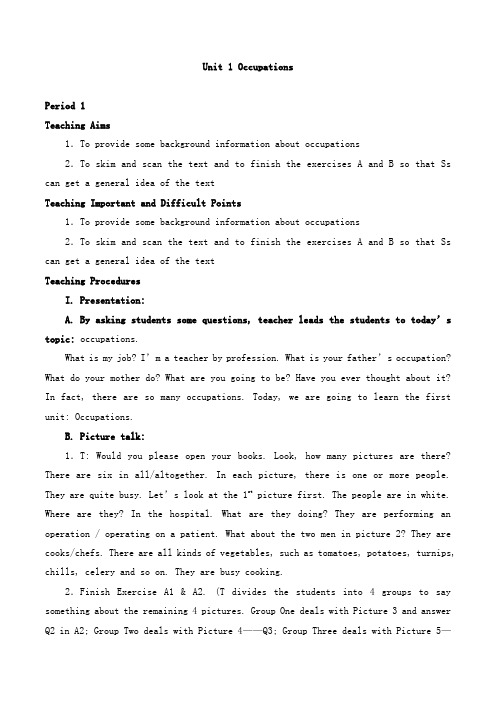
Unit 1 OccupationsPeriod 1Teaching Aims1.To provide some background information about occupations2.To skim and scan the text and to finish the exercises A and B so that Ss can get a general idea of the textTeaching Important and Difficult Points1.To provide some background information about occupations2.To skim and scan the text and to finish the exercises A and B so that Ss can get a general idea of the textTeaching ProceduresI. Presentation:A.By asking students some questions, teacher leads the students to today’s topic: occupations.What is my job? I’m a teacher by profession. What is your father’s occupation? What do your mother do? What are you going to be? Have you ever thought about it? In fact, there are so many occupations. Today, we are going to learn the first unit: Occupations.B.Picture talk:1.T: Would you please open your books. Look, how many pictures are there? There are six in all/altogether. In each picture, there is one or more people. They are quite busy. Let’s look at the 1st picture first. The people are in white. Where are they? In the hospital. What are they doing? They are performing an operation / operating on a patient. What about the two men in picture 2? They are cooks/chefs. There are all kinds of vegetables, such as tomatoes, potatoes, turnips, chills, celery and so on. They are busy cooking.2.Finish Exercise A1 & A2. (T divides the students into 4 groups to say something about the remaining 4 pictures. Group One deals with Picture 3 and answer Q2 in A2; Group Two deals with Picture 4——Q3; Group Three deals with Picture 5——Q4 and Group Four deals with Picture 6——Q5. )Notes: T should walk around and give help to students. Then teacher should elicit some information from the students first. Make sure that before Ss talk about each picture, teacher should provide some necessary words that are needed inC.Finish Exercise A3.D.Read the text and finish some questions(ref. To textbook: Qs with √)in Exercise B. (pair-work)Homework:1.Listen to the tape and read the text.2.Answer the remaining questions in Ex B.3.Preview the new vocabulary and prepare for tomorrow’s vocabulary test.4.Ex C1后记:1.凡上课文的每节课(一般为1-3课时)前有2分钟的Daily-report。
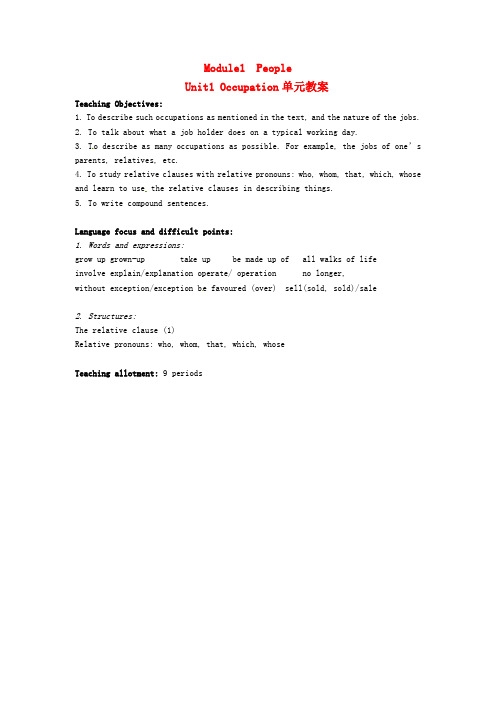
Module1 PeopleUnit1 Occupation单元教案Teaching Objectives:1. To describe such occupations as mentioned in the text, and the nature of the jobs.2. To talk about what a job holder does on a typical working day.3. T o describe as many occupations as po ssible. For example, the jobs of one’s parents, relatives, etc.4. To study relative clauses with relative pronouns: who, whom, that, which, whose and learn to use the relative clauses in describing things.5. To write compound sentences.Language focus and difficult points:1. Words and expressions:grow up grown-up take up be made up of all walks of lifeinvolve explain/explanation operate/ operation no longer,without exception/exception be favoured (over) sell(sold, sold)/sale2. Structures:The relative clause (1)Relative pronouns: who, whom, that, which, whoseTeaching allotment: 9 periods1. Reading (preparing)2. Reading (para1-4)3. Reading (para5-7)4. Structure: The relative clause (1)5. Listening6. Speaking7. Writing and additional reading8. Workbook9. SummaryPeriod OneWarming-up:1. Self-introduction2. Make the requests of this course to the students.3. Daily talk: the feeling for the new term, study, book and so on.Leading-in:1. Say names of occupations as many as possible2. Introduce the topic by the following questions:(1). where do the people in picture 1 and 2 work? What do they do?(hospital, surgeon(physician)/restaurant ,hotel, chef)(2). In picture 3,where is the lady standing? What is her occupation?(in he front of the class / teacher)(3). What do you think the people in picture 4 do?( fashion models)(4). What kind of people are likely to work in the office building?(mangers and secretaries )(clerk, lawyer, agent, director, agent, accountant, custom/ government officer) (white-collar, golden-collar)(5). What are the people doing in picture 6? What are their occupations?(build a high-rise or a skyscraper / builders) (blue-collar)Reading:1. Scan the text and answer the questions:(1). Where do teachers, surgeons, businesspersons and chefs work?(schools, colleges, universities / hospital / office building / hotel , restaurant) (2). Where do secretaries and fashion models work?(office building /appear on the stage)2.Time permitting, read the new words and expressions as well as the whole text.Homework:1. Copy new words and expressions.2. Prepare to say something about the jobs of your parents and relatives.3. What’s your favorit e occupation? Why?Period TwoWarming-up:1. Daily Talk: My favorite occupation2. Guess the occupations:① ( Surgeon ): They operate on sick people and repair the organs that no longer workproperly.② ( Fashion models ): They wear good-looking clothes and appear on the T-stage.③ ( Secretary ): They write letters, keep files, answer telephones and help the bossto finish work.④ ( Chef ): The chief cook in a restaurant or hotel.⑤ ( builders ): They work at unfinished high-rises or skyscrapers.Leading-in:Answer the following questions and notice the sentences:1. What do your parents do?2. What’s your father’s job?3. What’s your mother’s occupation?4. Where does your uncle work?5. Who does your aunt work for?Reading:Ⅰ. Scan the first two paragraphs and answer the questions.1. What tasks do teachers undertake ?(order books, explain lessons, give homework, correct papers, give grades to the students)2. How do they help their students?(in various ways, teach them to be honest, encourage, set a good example to the students through what they say and do.)Ⅱ. L isten to the tape, the teacher explains the text:1. occupation[u.] 居住; 占领 [c.]居住期,占有期; 职业; 业余活动,消遣under the occupation of 由……占领four-year occupation of the farm 对农场四年的占有期What is your occupation? 你的职业是什么?She has many occupations including gardening and wine-making. 他有许多消遣包括园艺和酿酒.By occupation 职业上的He is a teacher by occupation. 他的职业是老师。
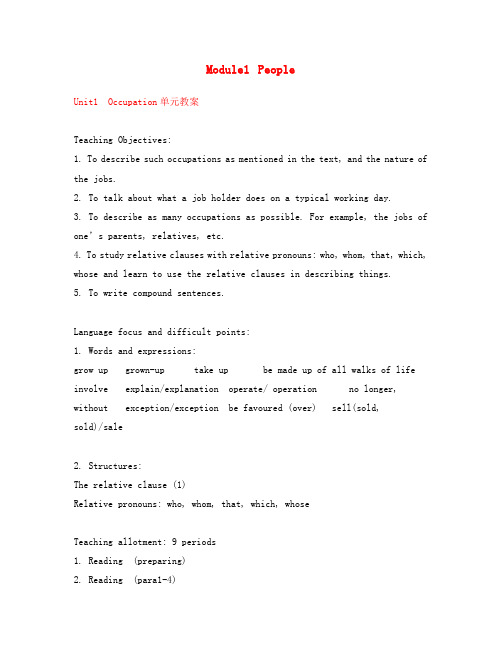
Module1 PeopleUnit1 Occupation单元教案Teaching Objectives:1. To describe such occupations as mentioned in the text, and the nature of the jobs.2. To talk about what a job holder does on a typical working day.3. To describe as many occupations as possible. For example, the jobs of one’s parents, relatives, etc.4. To study relative clauses with relative pronouns: who, whom, that, which, whose and learn to use the relative clauses in describing things.5. To write compound sentences.Language focus and difficult points:1. Words and expressions:grow up grown-up take up be made up of all walks of life involve explain/explanation operate/ operation no longer, without exception/exception be favoured (over) sell(sold,sold)/sale2. Structures:The relative clause (1)Relative pronouns: who, whom, that, which, whoseTeaching allotment: 9 periods1. Reading (preparing)2. Reading (para1-4)3. Reading (para5-7)4. Structure: The relative clause (1)5. Listening6. Speaking7. Writing and additional reading8. Workbook9. SummaryPeriod OneWarming-up:1. Self-introduction2. Make the requests of this course to the students.3. Daily talk: the feeling for the new term, study, book and so on.Leading-in:1. Say names of occupations as many as possible2. Introduce the topic by the following questions:(1). where do the people in picture 1 and 2 work? What do they do? (hospital, surgeon(physician)/restaurant ,hotel, chef)(2). In picture 3,where is the lady standing? What is her occupation? (in he front of the class / teacher)(3). What do you think the people in picture 4 do?( fashion models)(4). What kind of people are likely to work in the office building? (mangers and secretaries )(clerk, lawyer, agent, director, agent, accountant, custom/ government officer)(white-collar, golden-collar)(5). What are the people doing in picture 6? What are their occupations? (build a high-rise or a skyscraper / builders) (blue-collar)Reading:1. Scan the text and answer the questions:(1). Where do teachers, surgeons, businesspersons and chefs work? (schools, colleges, universities / hospital / office building / hotel , restaurant)(2). Where do secretaries and fashion models work?(office building /appear on the stage)2.Time permitting, read the new words and expressions as well as the whole text.Homework:1. Copy new words and expressions.2. Prepare to say something about the jobs of your parents and relatives.3. What’s your favorite occupation? Why?Period TwoWarming-up:1. Daily Talk: My favorite occupation2. Guess the occupations:① ( Surgeon ): They operate on sick people and repair the organs that no longer work properly.② ( Fashion models ): They wear good-looking clothes and appear on the T-stage.③ ( Secretary ): They write letters, keep files, answer telephones and help the boss to finish work.④ ( Chef ): The chief cook in a restaurant or hotel.⑤ ( builders ): They work at unfinished high-rises or skyscrapers.Leading-in:Answer the following questions and notice the sentences:1. What do your parents do?2. What’s your father’s job?3. What’s your mother’s occupation?4. Where does your uncle work?5. Who does your aunt work for?Reading:Ⅰ. Scan the first two paragraphs and answer the questions.1. What tasks do teachers undertake ?(order books, explain lessons, give homework, correct papers, give grades to the students)2. How do they help their students?(in various ways, teach them to be honest, encourage, set a good example to the students through what they say and do.)Ⅱ. Listen to the tape, the teacher explains the text:1. occupation[u.] 居住; 占领 [c.]居住期,占有期; 职业; 业余活动,消遣under the occupation of 由……占领four-year occupation of the farm 对农场四年的占有期What is your occupation? 你的职业是什么?She has many occupations including gardening and wine-making. 他有许多消遣包括园艺和酿酒.By occupation 职业上的He is a teacher by occupation. 他的职业是老师。
Unit 1 OccupationsPeriod 1【学习目标】1.能够基本掌握词汇、词组、句型及语法。
2.牢记各个知识点的用法,归纳总结异同点,通过习题加强巩固。
【学习重难点】1.能熟练运用单词、短语、句型。
2.能背诵课文中的重点句型或句子。
【学习过程】I. 词组句型II. Translate the following sentences into English.1.烹调有各种不同的方法。
(various)2.我决定听从她的建议,早点儿睡觉。
(follow)3.这支医疗队由两名外科医生和四名护士组成。
(make up of)4.你长大后想做什么?(grow up)5.警方怀疑这两起案件可能有关联。
(link)6.第二起交通事故涉及两辆小汽车和一辆卡车。
(involve)7.律师仔细地将程序解释给我们听。
(explain)8.女孩的脸上带着幸福的笑容。
(wear)9.音乐会有大量的观众。
(audience)10.男孩比女孩在做警察方面更受到偏爱。
(favour)11.许多家庭收集报纸以废物利用。
(collect)12.努力工作带来成功。
(produce)13.越来越苛刻的环境条例对经济的增长可能产生不利的影响。
(impact)14.俱乐部的成员包括各行业的人。
(walk)15.暴力犯罪的增加是一种新的趋势。
(trend)16.他给孩子的喉部动了手术,从而救了他的命。
(operate)。
Unit 1 OccupationsLearning aims1.Understand the meaning of the text2.Get to know the usage of the phrases in the text3.Develop speaking and listening skills during the interactionLearning focus and difficulties1.The explanation of the phrases2.The answering of the 4 questions in the passageLearning process1.Scan the text and answer the questions:(1)Where do teachers, surgeons, businesspersons and chefs work?Schools, colleges, universities /hospitals/office building/hotel, restaurant (2)Where do secretaries and fashion models work?Office building/appear on the stage2.Time permitting, read the new words and expressions as well as the whole text.cabinet 储藏柜,陈列柜traditional 传统上fashion 时装,时尚model 时装模特style 款式hairstyle 发型,发式trend 时髦,趋势all walks of life 各行各业A society is made up of people from all walks of life.try one’s best 尽最大努力Teachers try their best to help students gain new knowledge.be involved in 参与,忙于She was involved in the fashion show.all through one’s life 一生Teachers’ impact on students stays all through their lives.file cabinet 档案柜The file cabinet is full of student’s files.check in 签到You should check in first when you get to school.Bellboy a young man who carries bags, takes messages etc. in a hotel (宾馆里工作的)青年男服务员Suitcase a large case with a handle, used for carrying clothes and possessions when you travel 手提箱Tip a small amount of additional money that you give to someone, such as a waiter or a taxi driver 小费Chef a skilled cook, esp. the chief cook in a hotel or restaurant 厨师greengrocer someone who owns or works in a shop selling fruit and vegetables 蔬菜水果商Tiring making you feel that you want to sleep or rest 令人困倦的,令人疲劳的Demanding needing a lot of ability, effort or skill 要求高的,费力的,需要技能的Rewarding making you feel happy and satisfied because you feel you are doing something useful or important, even if you do not earn much money 值得做的,有意义的meaningful having a serious, important or useful quality or purpose 有意义的Challenging difficult in an interesting or enjoyable way 具有挑战性的Salary money that one receives as payment from the organization one works for 薪水薪金。
Unit1 occupations单元教案一、单元分析(Unit Analysis)(一)单元地位(Unit Position)1.本课在对多项职业描述时,谈及了各个职业的工作特性与职责范围以及从业人员的品性要求。
教师可围绕“职业”这一主题,设计活动让学生参与口语讨论,加强对社会各行各业的了解以及对从业人员的自身要求。
了解优秀的个性品质,为学生今后规划职业方向、踏上社会作了铺垫。
2.围绕本课主题“职业”,学生探讨选择一份工作的考虑因素:个人喜好、薪酬、工作环境、安全系数……。
并在此基础上,描述“我想从事的一份职业或事业”3.本课中出现了新的语法现象——定语从句。
本单元主要学习以下关系代词,who, whom, that, which, whose。
课文在对多种职业描述时,多运用定语从句加以描述。
如,Teachers are professionals who work in schools, colleges and universities. A secretary is a person who writes letters, answers the telephone, and receives people. 对于这一语法现象,教师有必要在课堂教学中加以一定的句型操练。
4.设计对话,小品等形式,让学生在任务型教学模拟情境中反复操练本单元出现的定语从句语法现象。
(二)单元目标(Unit Target)1 了解定语从句语法现象,能区别关系代词who, whom, that, which, whose 并熟练运用定语从句进行描述。
2 能对社会常见职业进行简单描述。
(工作性质、场地、时间、要求……)3 能谈论家庭成员或朋友、亲戚的一天工作经历。
4 了解连词的作用,学会写复合句。
(三)单元重点(Unit Points)1 关键词:u 语言知识类take up, all walks of life, be made up of, be involved in, impact on, difference between life and death, without exception, cooperate with, be favored overu 交际功能类1)职业:teacher, surgeon, chef, secretary, businessperson, fashion model, fireman, bellboy, policeman, grocer, engineer, cook …2)人物性格、气质:quick-minded, knowledgeable, wise, understanding, skillful, smart, patient …2 功能:1)Talking about occupations(描述“职业”)参考课本第12页Useful Languagel I find my job interesting/ challengingl I get a monthly wage / salary of 2,000l I work on three shifts.l I work for the computer company.l I’m a sales manager for …l I’m a secretary to Mr. Brownl The job is demanding, but very interesting.l My job involves typing, telephoning, and so on.l We have our lunch break from 12:00 to 13:00.l We have to check in at eight in the morning and cannot check out before 5:00PM.2)Describing things using relative clauses(“定语从句”描述事物)l The girl who won first prize in the contest is from Beijing.l Have you seen my notebook whose cover is green?3 语法点:本课出现了定语从句关系代词who, whom, that, which, whose,应作为本课的教学重点。
Unit 1 Occupation教案1Teaching Objectives:1. To describe such occupations as mentioned in the text, and the nature of the jobs.2. To talk about what a job holder does on a typical working day.3. To describe as many occupations as possible. For examp le, the jobs of one’s parents, relatives, etc.4. To write compound sentences.Language focus and difficult points:1. Words and expressions:grow up grown-up take up be made up of all walks of lifeinvolve explain/explanation operate/ operation no longer,without exception/exception be favoured (over) sell(sold, sold)/sale2. Structures:The simple present tense and past tense.Teaching aims:1. understand the meaning of the text2. get to know the usage of the phrases in the text3. develop speaking and listening skills during the interactionTeaching focus:1. the 4 occupations and their respective functions2. the explanation of the phrases appear in the textTeaching difficulties:1. the explanation of the phrases2. The answering of the 4 questions in the passageTeaching process:Step1 Warming-upself- introductionmake the requeses of this course to the stusStep 2 leading-insay names of occupations as many as possible.introduce the topic by the following questions.Step 3 Readingwhere do the people in picture 1 and 2 work ?what do they do ?(hospital, surgeon/physician/restaurant, hotel,chef)In picture 3, where is the lady standing ? What is her occupation?(in her front of the class/teacher)What do you think the people in picture 4 do ?(fashion models)What kind of people are likely to work in the office building?(manages and secretaries,clerk,lawyer,agent,accountant,custom/government officer)(white-collar, goldern-collar)What are the people doing in picture 6?What are their occupations?(build a high-rise or a skyscraper/builders)(blue-collar)Step 4 Read the 1st paragraph and explain the phrasesKey phrases and points of the 1st paragraph1. all walks of life (different and various occupations of society) 各行各业people from all walks of life2. grow up (to develop from a child to an adult) 长大成人What do you want to be when you grow up?比较: bring up( to develop by the help of others) 养大,带大He was brought up by his grandparents. = His grandparents bring him up. grown-up adj. 长大的,成人的 / n. 成人 She has a grown-up daughter who lives abroad. Most of the audience are grown-ups.3. take up (to start or begin sth. as a job or an interest)从事 (后接职务或兴趣爱好等名词) She wants to take up the law. He took up painting when he retired last year. take up 占据(空间/ 时间)take up too much/ time 自发的学会 I took up French when I stayed in France.4. various adj. 各种各样的,多种的 = a variety of 名词词组 Customers have various choices in the supermarket. Customers have a variety of choices in the supermarket. 5. society n. 社会表示一般的社会时, 前面不加任何冠词; 如果指特定的某一社会可加冠词 A thief is a danger to society. The society of the Greeks was based on freedom. 6. be made up of 由…构成/组成People’s Republic of China is made up of 56 nationalities. The medical team was made up of three doctors and two nurses. 7. in the future 将来,未来 What occupation do you take up in the future? 8. following adj. 以下的,下面的 The following instructions may give you some idea.9. some + 单数名词, 表示某一 =a certain10.operate (v.) 操作,动手术 / operation (n.)操作,行动,手术Can you operate the machine? 你能操作这台机器吗?to operate a machine 开机器to operate a factory 开工厂operating-table 手术台The doctors operated on her stomach. 医生给她的胃动了手术。
an operation on her stomach 给她的胃动的手术You can get a private doctor to operate her.Perform operation 动手术Two days later the operation was performed.11. no longer (not any longer, not any more) 不再...He no longer lives here.He doesn’t live here any longer.No longer/no more: no longer 表示时间概念,相当于not…any longer, 用来表示一种持续状态的终止。
No more 表示数量与程度,相等于not…any more,用来表示不再重复以前发生过的动作。
e.g. He is no longer young. 指年轻状态的终止。
He still smoked, but he drank no more. 指不再有喝酒的行为。
No longer 常置于行为动词之前或be动词之后, no more 则置于行为动词之后。
12. without exception 毫无例外be of no exception 无例外的You must answer all the questions without exception.你必须毫无例外地回答所有问题。
All men between 18 and 45 without exception are expected to servein the army during a war.战争期间,希望所有18到45岁男子无一例外地去军队服役。
There is an exception to this grammatical rule.这条语法规则有个例外。
Everyone here should clean the room, and he is of no exception.这里的每个人都得打扫房屋,他也不例外.13. be favoured (over)Females are favoured over males in that kind of job.my favorite book/jobI am in favor of stopping work now. 我赞成现在停止工作。
Step 51.Scan the text and answer the questions:Where do teachers ,surgeons, businesspersons and chefs work ?(schools,colleges,universities/hospitals/office building/hotel,resturant) (2).Where do secretaries and fashion models work?(office building/appear on the stage)2.Time permitting, read the new words and expressions as well as the whole text. cabinet 储藏柜,陈列柜traditional 传统上fashion 时装,时尚model 时装模特style 款式hairstyle 发型,发式trend 时髦,趋势all walks of life 各行各业A society is made up of people from all walks of life.try one’s best 尽最大努力Teachers try their best to help students gain new knowledge.be involved in 参与,忙于She was involved in the fashion show.all through one’s life 一生Teachers’ impact on students stays all through their lives.file cabinet 档案柜The file cabinet is full of student’s files.check in 签到You should check in first when you get to school.bellboy a young man who carries bags, takes messages etc. in a hotel(宾馆里工作的)青年男服务员suitcase a large case with a handle, used for carrying clothes and possessions when you travel手提箱tip a small amount of additional money that you give to someone, such as a waiter or a taxi driver小费chef a skilled cook, esp. the chief cook in a hotel or restaurant厨师greengrocer someone who owns or works in a shop selling fruit and vegetables 蔬菜水果商tiring making you feel that you want to sleep or rest令人困倦的,令人疲劳的demanding needing a lot of ability, effort or skill要求高的,费力的,需要技能的rewarding making you feel happy and satisfied because you feel you are doing something useful or important, event if you do not earn much money值得做的,有意义的meaningful having a serious, important or useful quality or purpose 有意义的challenging difficult in an interesting or enjoyable way具有挑战性的salary money that one receives as payment from the organization one works for 薪水薪金Step 6 Teaching reflection本课是本单元的第一部分,教学的重点是培养学生学会用英语交流谈论职业、工作的话题,并学会对个人观点、态度等的表达方法。